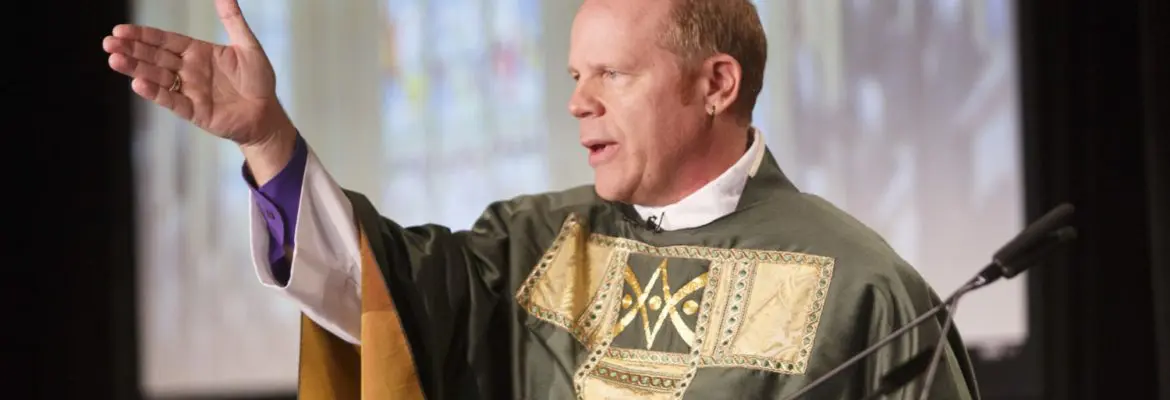
Dear Friends,
For the past four days, the National House of Bishops gathered at Mount Carmel in Niagara Falls. While some of our time was spent dealing with issues of concern, our primary focus was the prayerful discernment of a slate of nominees for Primate of the Anglican Church of Canada. The election of a new Primate will take place at this year’s meeting of General Synod – with voting membership from across the Canadian church – when we gather in London, Ont. from June 23-29.
Our meeting was steeped in prayer, bible study and reflection from start to finish. One day, after Communion, just before the doxology, our presiding celebrant, Archbishop Anne Germond, inserted a prayer by Archbishop Oscar Romero that set a tone for our collective work. In part it read:
It helps, now and then, to step back and take the long view.
The Kingdom is not only beyond our efforts,
it is even beyond our vision.
We accomplish in our lifetime only a tiny fraction of
the magnificent enterprise that is God’s work.
Nothing we do is complete,
which is another way of saying that
The Kingdom always lies beyond us.
No statement says all that should be said.
No prayer fully expressed our faith.
No confession brings perfection.
No pastoral visit brings wholeness.
No program accomplishes the Church’s mission.
No set of goals and objectives includes everything.
This is what we are about.
We plant the seeds that one day will grow.
We water the seeds already planted,
knowing that they hold future promise…
Calling a new Primate is part of planting the seeds. It is the responsibility of the House of Bishops to nominate, from amongst their own order, at least three bishops who we believe have the call and the charisms to serve as our national archbishop. All bishops in the House of Bishops are eligible for nomination.
The names of those selected were shared publicly yesterday. They are:
- The Most Rev. Christopher Harper, National Indigenous Archbishop
- The Most Rev. Gregory Kerr-Wilson, Archbishop of Calgary
- The Rt. Rev. David Lehmann, Bishop of Caledonia
- The Rt. Rev. Riscylla Shaw, Bishop Suffragan of Toronto
Naturally, I have mixed emotions about that last nominee, and perhaps you do too. Bishop Riscylla was elected in 2016 to be a bishop in the Diocese of Toronto, and has served our Diocese first as the area bishop of Trent-Durham and more recently as the suffragan with episcopal oversight of the North and East archdeaconries. She brings special insight to the College of Bishops table, a deep commitment to this Diocese, and a passion for justice and reconciliation that is inspired by her close walk with her Saviour, Jesus Christ.
But Bishop Riscylla has also shared her gifts with the wider Church, not just in leading retreats for other dioceses across Canada but by serving on international bodies both for the Anglican Communion and the World Council of Churches. It is understandable that the House of Bishops sees her as a potential candidate for the next Primate of all Canada.
Canon III on the Primacy stipulates that whoever is elected as Primate has “not more than 90 days” after their election to resign their episcopal office and take up their new role. If Bishop Riscylla is chosen for Primate, we will look for the appropriate time to call for the election of a new suffragan bishop in Toronto. Our Diocese has recently transitioned to a new episcopal model of three bishops (one diocesan and two suffragans) supported by five archdeacons, and I believe this new system of episcopal oversight needs to continue for the immediate future.
However, should the General Synod and the Holy Spirit determine that Bishop Riscylla will continue to serve in Toronto, I know that she will still bring her gifts and energy to our Diocese, to which I know she is firmly and deeply committed.
I invite you to pray for these four candidates for Primate, as they courageously and faithfully offer to serve God’s church in this generous and expansive way. I ask you to entreat the Holy Spirit to inspire the members of General Synod with wisdom and discernment as they consider who may best lead our national Church in these challenging yet exciting times.
I conclude with more of Archbishop Romero’s prayer:
We lay the foundations that will need further development.
We provide yeast that produce effects far beyond our capabilities.
We cannot do everything,
and there is a sense of liberation in realizing that.
This enables us to do something, and to do it very well.
It may be incomplete, but it is a beginning,
a step along the way,
an opportunity for the Lord’s grace to enter and do the rest…
Yours in Christ,
The Rt. Rev. Andrew Asbil
Bishop of Toronto